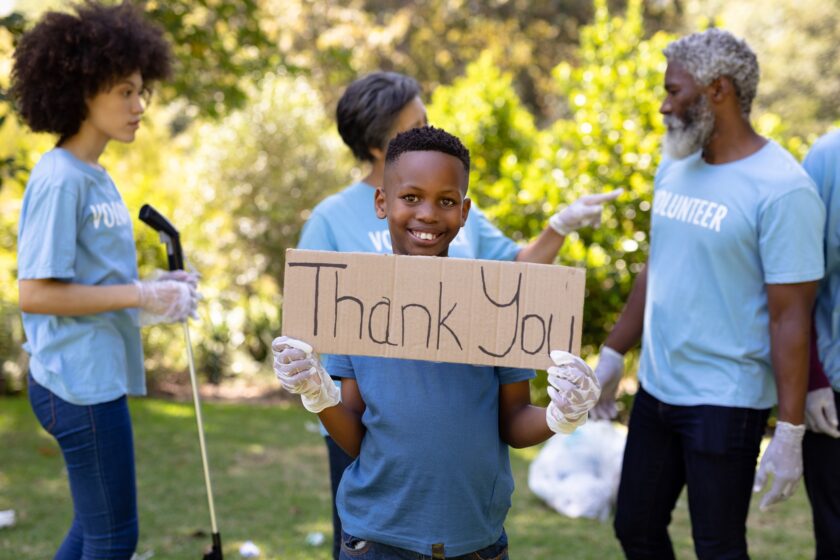What is gratitude and why is it important to instill an attitude of gratitude in children?
Of course, it starts with manners, but it’s more than please and thank you, it’s a mindset. It’s when we express acknowledgement, appreciation, and thanks for the good things in our lives. It could be physical gifts, but more about daily awareness of the gifts of people, events, kindness, and experiences we encounter every day. Making a habit out of expressing gratitude will lead to a lifelong attitude of gratitude for children, leading to a happy life.
Benefits of having an attitude of gratitude in children
Expressing thanks is a simple way to increase overall happiness and bring on a positive attitude of gratitude in children. A study in 2012 about gratitude found that those who practice gratitude enjoy better relationships, which leads to happiness. Other benefits include:
- Consistent prosocial behavior (see below)
- Positive mindset
- Increased self-esteem
- Compassion for others/develops empathy
- Positive attitude towards school
- Positive interactions with family and friends
- Reduced stress
- Better sense of self
- Dispels negative emotions
- Builds resilience
Prosocial Behaviors: The Foundation of Gratitude in Children
Related to gratitude in children is the idea of prosocial behavior, which is the ability to share with others, cooperate with others, and be considerate of others. This is the foundation of being able to be grateful, and can be observed, and practiced through play. The National Association for the Education of Young Children (NAEYC) pointed out that “preschoolers are capable of engaging in truly cooperative play with their peers and forming real friendships. However, development of these important social skills is not automatic for children. They need coaching and supervision to learn and maintain appropriate behaviors with others.”
Teachers and parents can guide children in developing the skills and behaviors necessary to act in a prosocial manner. Children should have opportunities to play and work with others, make choices and encounter consequences of working with others, determine ways to enter play with others, and to negotiate social conflicts with words.
Caretakers and teachers can support the development of prosocial behaviors by doing the following:
- Emphasizing cooperation rather than competition
- Teaching games that emphasize cooperation and conflict resolution
- Setting up classroom spaces and materials to facilitate cooperative play
- Using literature to enhance empathy and caring
- Encouraging social interactions between children of different abilities whether it is social, emotional, or physical
- Observing and discussing prosocial behaviors (sharing, cooperating, and being considerate)
- Being a good role model
- Providing a caring environment (caring for pet, grandparents, garden, neighbors)
Parents play an integral role in helping children develop prosocial behaviors
Parents have opportunity to begin developing prosocial behavior at a very young age by incorporating the ideas above, in addition to the following:
- Providing clear expectations about behavior
- Noticing and labeling when children engage in prosocial behavior
- Giving responsive and empathetic care: children are likely to give what they have received when it comes to caring relationships
- Assigning developmentally appropriate daily tasks and chores – not only does this give the child a sense of belonging, but also a sense of being able feel helpful and contribute to the household
- And we’ll say it again – modeling positive interactions is the most powerful way for a child to internalize the importance and benefits of these actions
Teaching the Attitude of Gratitude to Children
The Raising Grateful Children Project at UNC Chapel Hill discusses four parts of practicing gratitude (see below). These can be developed organically by discussing people, places, things, events, and activities taking place in everyday life with children. Here are the four parts and questions to ask:
- Noticing – become aware of a person, place, thing, activity, you want to appreciate
- Did someone do something nice for you today?
- Did someone give you something today?
- Did someone do something fun with you today?
- Thinking – think about why these things happen in your life
- What are the reasons you are thankful for this person/thing/activity?
- Why do you think they did something nice for you?
- What might you have done to deserve their kindness?
- How do you feel about this person/thing/activity?
- Feeling – the emotions you experience as a result of the gift/person/activity
- How do you feel when you think about this person/gift/activity?
- Can you name an emotion (happy, excited, calm, peaceful, loved, proud)
- Doing – the way you express appreciation
- What can you do to express your gratitude for this person/gift/activity?
Practicing Gratitude with Children
Below, find some daily habits, activities, and resources for instilling an attitude of gratitude in children:
- Share what you’re thankful for each night before bed (or at dinner, or breakfast)
- Here’s a list of gratitude conversation starters from Creative Family Fun
- Start a Gratitude jar – allows a visual of everything to be thankful for. Blissful kids includes activities and ideas for how to revisit your gratitude jar
- Gratitude walks – slow down, enjoy the environment/scenery, appreciate the beauty around you
- Pay it forward – volunteer, or help a friend or family member (lead by example)
- Write thank you notes (draw or color a handmade card) – to grandparents, to friends, just because
- Take photos throughout the week, make a collage
- Build a tree of thanks – add leaves on the tree (or other symbolic shapes representing your culture, holidays, traditions)
- Make gratitude rocks – leave on neighbor’s doorsteps, place them in public places, around your own yard
- Start a gratitude journal – lots of options and templates online, such as this one from Mindfulmazing
- Read books about gratitude. Here’s a list of 6 children’s books that teach gratitude



Comment and make it public on Facebook